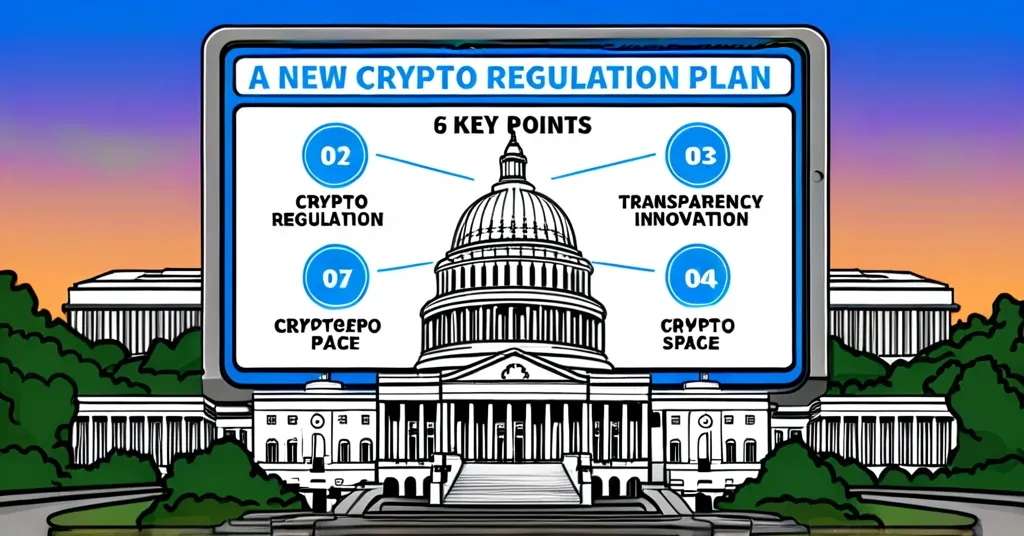Coinbase Unveils 6-Point Plan to Revolutionize U.S. Crypto Regulations

Coinbase’s Bold Blueprint: A 6-Point Plan to Revamp U.S. Crypto Regulations
Coinbase, a leading cryptocurrency exchange, is challenging the current U.S. regulatory landscape with a comprehensive six-point plan aimed at fostering a more crypto-friendly environment, aligning with President Donald Trump’s ambition to make the U.S. a global crypto hub.
- Coinbase proposes six key areas for U.S. crypto regulation reform
- Calls for CFTC to oversee Bitcoin and Ethereum, not the SEC
- Advocates for clear digital asset definitions and balanced DeFi, NFT regulations
At the forefront of Coinbase’s proposal is a significant shift in regulatory oversight. The company suggests that the Commodity Futures Trading Commission (CFTC), which regulates commodity futures and options markets, should take over the regulation of major cryptocurrencies like Bitcoin and Ethereum from the Securities and Exchange Commission (SEC). This move is based on the argument that these cryptocurrencies align more closely with commodities than securities. “Coinbase argues that the CFTC is better suited than the SEC to regulate cryptocurrencies like Bitcoin and Ethereum,” stated Faryar Shirzad, Coinbase’s Chief Policy Officer, highlighting the industry’s ongoing frustration with SEC oversight.
Moving beyond the oversight shift, Coinbase’s plan dives deeper into the need for clear definitions of digital assets. The proposal aims to prevent the automatic classification of every token as a security, which could stifle innovation and entangle projects in regulatory red tape. By advocating for a smarter approach to token classification, Coinbase seeks to recognize the unique nature of each digital asset, allowing crypto ventures to raise capital more freely.
Stablecoins, which are cryptocurrencies designed to maintain a stable value relative to a national currency or other assets, are another focus of Coinbase’s plan. The company underscores the importance of robust stablecoin regulation to bring clarity and stability to the market. Meanwhile, Coinbase champions a balanced approach to regulating decentralized finance (DeFi) and non-fungible tokens (NFTs). Over-regulation could snuff out the innovation that makes these sectors vibrant. “Coinbase emphasizes the need to protect DeFi and NFTs from over-regulation, while also calling for clear federal and state guidelines,” Shirzad noted, advocating for a regulatory framework that nurtures growth.
This six-point plan arrives amidst a shifting regulatory landscape. The Trump administration has shown increasing support for the crypto industry, aiming to position the U.S. as a leader in this space. Legislative efforts, such as the 2024 House bill to clarify CFTC and SEC roles, and the establishment of a working group to support crypto under Trump’s executive order, suggest an opportune moment for Coinbase’s proposal to gain traction.
Yet, Coinbase’s proposal faces potential challenges. The SEC’s ongoing efforts to develop a comprehensive regulatory framework, including the “Crypto 2.0” task force led by Commissioner Hester Peirce, suggest a more collaborative approach might be necessary. The recent decision to drop an investigation into Paxos and BUSD further complicates the narrative around stablecoin classification. Additionally, the CFTC’s settlement with Uniswap Labs highlights the challenges of regulating DeFi, underscoring the need for nuanced regulation that doesn’t stifle innovation.
As Coinbase throws its hat into the regulatory ring, the future of U.S. crypto regulation hangs in the balance. Will this blueprint be the key to unlocking a new era of innovation, or will it face a regulatory roadblock?
Key Takeaways and Questions
- What are the six key priorities outlined by Coinbase for improving U.S. crypto regulation?
The six priorities are: clear definitions for digital assets, shifting oversight away from the SEC to the CFTC, a smarter approach to token classification, stablecoin regulations for market clarity, protecting DeFi and NFTs from overregulation, and clear federal and state guidelines for centralized exchanges.
- Why does Coinbase believe the CFTC should regulate cryptocurrencies like Bitcoin and Ethereum?
Coinbase believes the CFTC is better suited than the SEC because these assets align more with commodities than securities.
- How does Coinbase propose to protect DeFi and NFTs from over-regulation?
Coinbase advocates for a balanced approach to avoid stifling innovation, emphasizing the need for clear federal and state guidelines.
- What is the current U.S. administration’s stance on cryptocurrency regulation?
The Trump administration supports the crypto industry, aiming to position the U.S. as a global crypto hub.
- What could be the potential impact of implementing Coinbase’s proposed regulatory reforms?
Implementing these reforms could bring clarity to the industry, protect consumers, foster innovation, and prevent the U.S. from falling behind in crypto innovation.
- What challenges might Coinbase’s proposal face?
Potential resistance from the SEC, the need for a collaborative approach, and complexities in regulating DeFi and NFTs.
- How might clear digital asset definitions impact the crypto industry?
Clear definitions could prevent automatic classification as securities, allowing for more innovation and easier capital raising.



